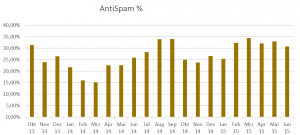There are a lot of spam statistics and figures describing the current state of email security. Recently the IT security provider Symantec, however, published a rather remarkable figure in its Intelligence Report – June 2015: “only” 49.7 percent of all emails presently sent are spam messages. The proportion of spam emails has sunk below the level of wanted emails for the first time in 12 years. With this figure, Symantec is confirming a trend. Be careful, however, to read the fine print: the authors don’t differentiate between consumer and business emails in the survey.
By contrast, Retarus has collected figures specifically regarding B2B messaging. The provider of email security services filtered spam messages comprising almost 31 percent of all messages from the email communication of companies around the world. In contrast to private communication, the amount of spam in B2B email messaging shows no distinct trend. The proportion of spam in emails sent to companies has remained relatively constant, with slight fluctuation both upwards and downwards. Since February 2015 there has in fact been a slight increase in spam.Clear reporting a deciding factor for email security
Companies, whose email communication is safeguarded by Retarus, can fortunately put such figures out of their minds. They continue to notice no spam emails at all. Unwanted emails do not even reach the company’s IT infrastructure. Administrators and users, however, still have control over all communication – a deciding factor for companies in accepting a spam and virus filter. Using the web-based Retarus Enterprise Administration Services portal, administrators are able to retrieve statistics and reports about their company’s entire email communication at any time. Users, on the other hand, are able to get a quick overview of all emails filtered out from his/her personal email account in the clearly structured E-Mail Security Report. All quarantined messages are made available for download to PCs, tablets or smart phones.
Innovative functions facilitate efficient communication
In any case, spam is not the main reason users at companies which employ innovative, reliable email security services become fed up with using email as a communication channel. A much greater source of annoyance are emails from colleagues or the boss received after office hours or on the weekend, and messages from which the attachment has been removed due to size limits. Security officers, on the other hand, can’t accept the fact that even confidential information can easily be transmitted from the company without any special protection. Modern email security services are hence required to solve these issues in addition to spam and virus protection. Quiet Time, Data Leakage Prevention and Large E-Mail Handling are only a few of the functions ensuring that email communication, which is now already 44 years old, can once again become both efficient and fun to use.





